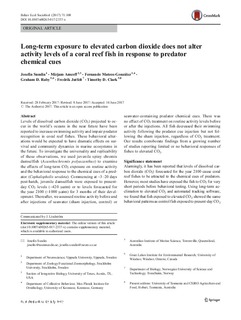| dc.contributor.author | Sundin, Josefin | |
| dc.contributor.author | Amcoff, Mirjam | |
| dc.contributor.author | Matteos-Gonzales, Fernando | |
| dc.contributor.author | Raby, Graham | |
| dc.contributor.author | Jutfelt, Fredrik | |
| dc.contributor.author | Clark, Timothy | |
| dc.date.accessioned | 2017-08-10T06:27:26Z | |
| dc.date.available | 2017-08-10T06:27:26Z | |
| dc.date.created | 2017-08-09T12:03:31Z | |
| dc.date.issued | 2017 | |
| dc.identifier.issn | 0340-5443 | |
| dc.identifier.uri | http://hdl.handle.net/11250/2450345 | |
| dc.description.abstract | Levels of dissolved carbon dioxide (CO2) projected to occur in the world’s oceans in the near future have been reported to increase swimming activity and impair predator recognition in coral reef fishes. These behavioral alterations would be expected to have dramatic effects on survival and community dynamics in marine ecosystems in the future. To investigate the universality and replicability of these observations, we used juvenile spiny chromis damselfish (Acanthochromis polyacanthus) to examine the effects of long-term CO2 exposure on routine activity and the behavioral response to the chemical cues of a predator (Cephalopholis urodeta). Commencing at ~3–20 days post-hatch, juvenile damselfish were exposed to present-day CO2 levels (~420 μatm) or to levels forecasted for the year 2100 (~1000 μatm) for 3 months of their development. Thereafter, we assessed routine activity before and after injections of seawater (sham injection, control) or seawater-containing predator chemical cues. There was no effect of CO2 treatment on routine activity levels before or after the injections. All fish decreased their swimming activity following the predator cue injection but not following the sham injection, regardless of CO2 treatment. Our results corroborate findings from a growing number of studies reporting limited or no behavioral responses of fishes to elevated CO2. | nb_NO |
| dc.language.iso | eng | nb_NO |
| dc.publisher | Springer Verlag | nb_NO |
| dc.rights | Navngivelse 4.0 Internasjonal | * |
| dc.rights.uri | http://creativecommons.org/licenses/by/4.0/deed.no | * |
| dc.title | Long-term exposure to elevated carbon dioxide does not alter activity levels of a coral reef fish in response to predator chemical cues | nb_NO |
| dc.type | Journal article | nb_NO |
| dc.type | Peer reviewed | nb_NO |
| dc.description.version | publishedVersion | nb_NO |
| dc.source.journal | Behavioral Ecology and Sociobiology | nb_NO |
| dc.identifier.doi | 10.1007/s00265-017-2337-x | |
| dc.identifier.cristin | 1485147 | |
| dc.description.localcode | This article is distributed under the terms of the Creative Commons Attribution 4.0 International License (http://creativecommons.org/licenses/by/4.0/), which permits unrestricted use,distribution, and reproductionin any medium, provided you give appropriate credit to the original author(s) and the source, provide a link to the Creative Commons license, and indicate if changes were made. | nb_NO |
| cristin.unitcode | 194,66,10,0 | |
| cristin.unitname | Institutt for biologi | |
| cristin.ispublished | true | |
| cristin.fulltext | original | |
| cristin.qualitycode | 1 | |

